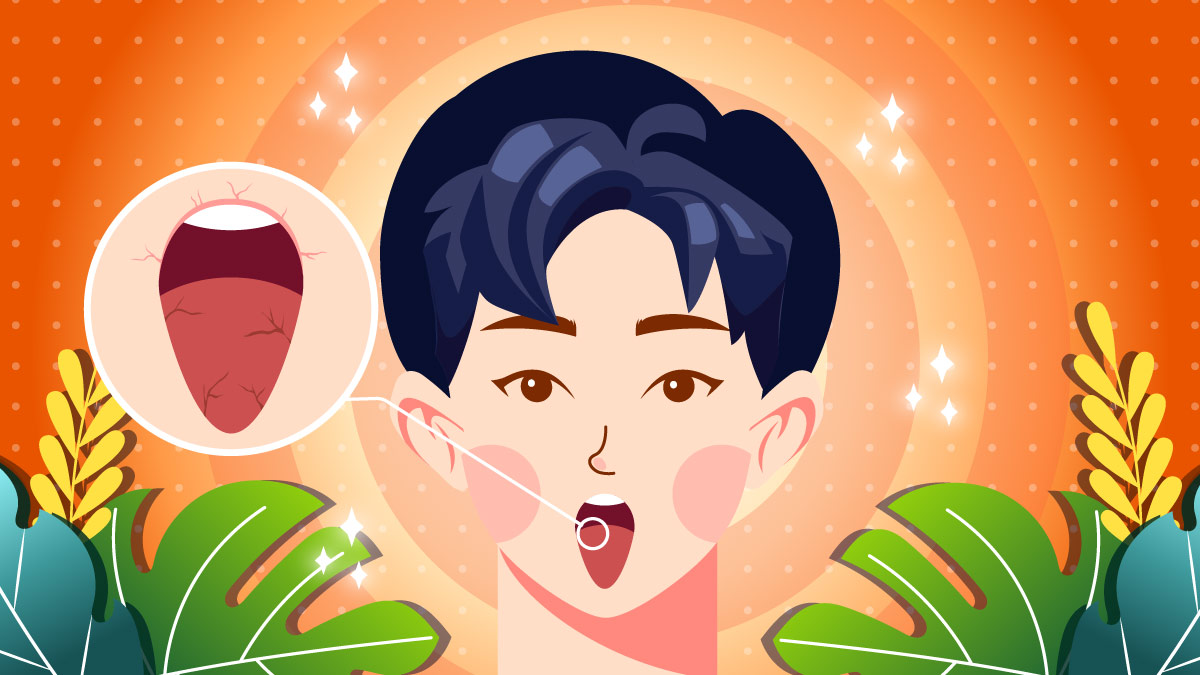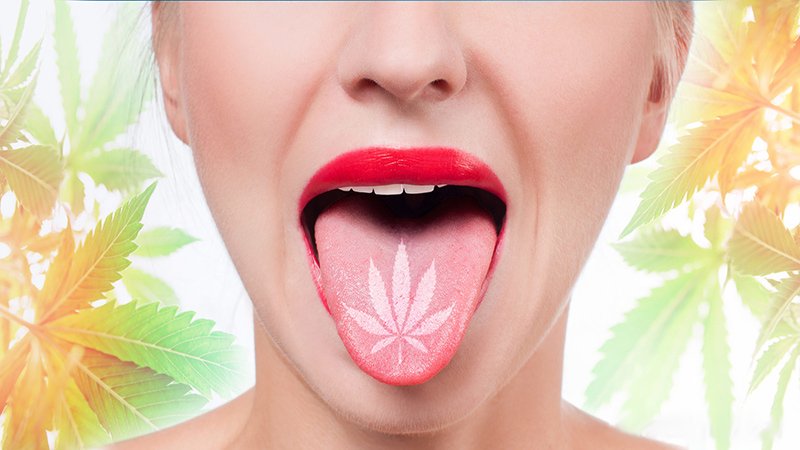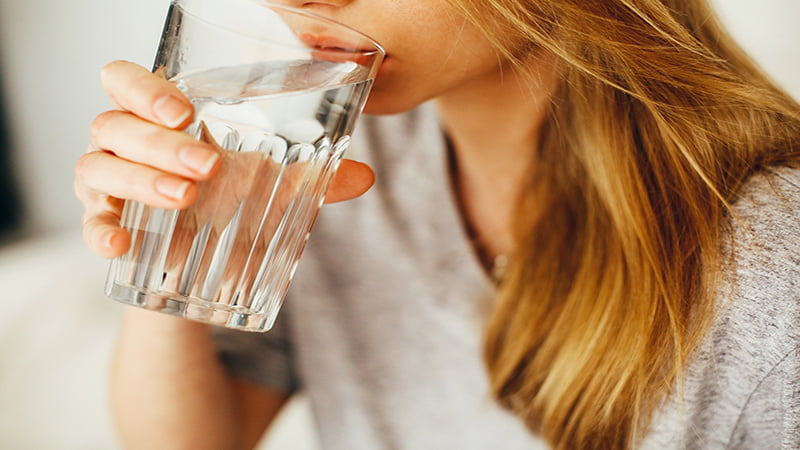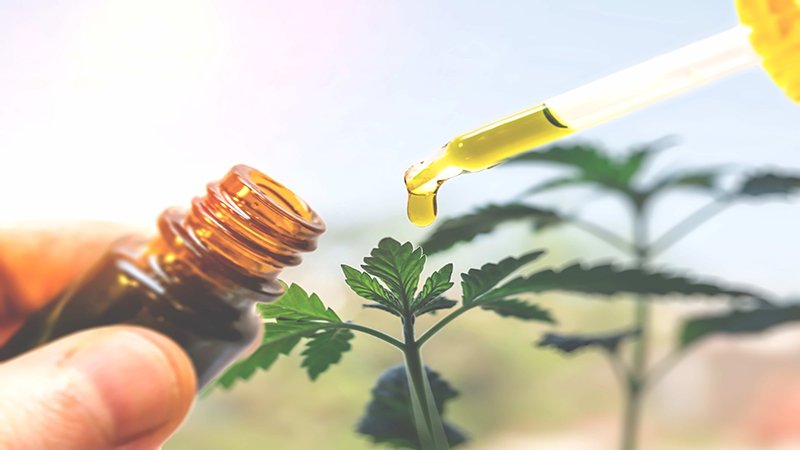Can CBD Oil Cause Dry Mouth?

Do you regularly experience dry mouth after taking CBD? You’re not alone.
In fact, this effect is common for all cannabinoids, not only for CBD. But does it mean that cannabis users just have to accept it and go on with their supplementation?
Or is there a way to minimize the dry mouth effect after using CBD oils and vapes?
There are at least a few ways to help you cope with the cottonmouth.
It’s just so common that hardly anyone is questioning the mechanism at work.
Today, we explain why CBD gives you the dry mouth feeling and how to cope with it using some simple tricks.
Why Does CBD Cause Dry Mouth (Cottonmouth)

Several factors can cause dry mouth after taking CBD oil or any cannabis-based product. This section holds the answer to the “why” behind the cottonmouth effect.
Cannabinoids Affect Salivary Glands
Several studies point to cannabis use as the reason for having a dry mouth. A 1986 study on the effects of CBD noted that the side effects of oral CBD included dry mouth.
Since then, a few other studies have investigated this effect. Oral dryness even has a scientific name — xerostomia.
Perhaps the most relevant study on CBD-induced oral dryness comes from the researchers at the University of Buenos Aires, Argentina, in 2006. The authors found that cannabinoid receptors type 1 and 2 (CB1 and CB2) occur in the submandibular glands, which lie beneath the bottom of the mouth and are responsible for the secretion of 60-67% of the saliva (1).
The research team found that anandamide, which is one of the two major endocannabinoids produced by the body, binds with high affinity to these cannabinoid receptors and blocks the secretion of saliva.
Both THC and CBD interact with the cannabinoid receptors of the parasympathetic nervous system, so they’re likely to affect the receptors of the submandibular glands in a similar fashion.
CBD May Signal Your Brain to Slow Down Saliva Production
The said study also concluded that the role of the endocannabinoid system reaches beyond simply blocking signals at the submandibular glands themselves. The nervous signals are first created in the brain.
The researchers drew out a hypothesis that intravenous application of cannabinoids through the femoral vein not only blocked the saliva secretion in the submandibular gland but it may also have interacted with the CB1 and CB2 receptors in the brain itself. They proposed that the central nervous system helps to control saliva production at the glandular level.
Impurities in CBD Oil
Contaminated CBD oils can contain dangerous byproducts, causing serious health risks. These contaminants can cause irritation in the mouth and lungs, resulting in dry mouth or irritation of the oral tract.
If you’re experiencing severe discomfort caused by the dryness, itchiness, or swelling of your mouth and throat — seek medical attention immediately. This isn’t a normal side effect of CBD oil.
Too High a Dose
Agencies responsible for regulating food safety have advised users not to exceed a dose of 100 mg of CBD daily for healthy adults. Breaching this threshold can lead to side effects like dry mouth.
Smoking Cannabis
Different forms of CBD can produce various side effects. For example, smoking CBD flowers or dabbing CBD concentrates can irritate your mouth, throat, and lungs, causing coughing and dryness in the mouth for some individuals.
Using Sprays and Tinctures
Using sublingual forms of CBD, such as sprays or tinctures, causes the CBD to absorb through the mucous membrane in the mouth. From there, CBD can reach the cannabinoid receptors in your salivary gland, inhibiting saliva secretion and causing dry mouth.
Taking these forms of CBD more frequently can cause regular discomfort in the mouth and even an unpleasant stinging sensation in some cases.
Vaping CBD
Vaping CBD is considered safer than smoking because it produces fewer toxic byproducts such as carcinogens. However, the flavorings and thinning agents used in vape oils can cause serious health risks. Moreover, when you vape CBD, it also reaches your salivary glands, thus reducing saliva secretion in the mouth.
How to Cope with Dry Mouth from CBD?

As you can see, CBD and dry mouth come hand in hand, so it’s no wonder why people are seeking ways to cope with this side effect.
Worse yet, you don’t need to take much CBD in order to experience dryness in the mouth. For heavy CBD users, this side effect is their daily companion — and an annoying one, to be honest.
Preventing cottonmouth is better than having to fight it when it appears. Here are a few ways to help yourself cope and de-escalate this unpleasant sensation before it becomes a pain in the mouth.
1. Hydrate Yourself
The best method for preventing or reducing the offset of cottonmouth while using CBD oil is to drink a lot of water and take care of proper hydration throughout the day. Also, drinking other hydrating liquids such as electrolytes right before, during, and after taking CBD oil can help diminish this annoying problem to some extent. Drinking herbal teas and warm water is the best for hydration and easing sore throat.
2. Increase Saliva Production
Try using toothpaste, lozenges, or lollipops to combat mouth dryness by increasing saliva production. Sucking on lollipops or hard candies stimulates your salivary glands to produce more saliva and creates a moist film lining the mucous membranes and preventing dryness in the mouth and throat.
3. Chew Gum
Choosing CBD-infused chewing gum is one of the best ways to avoid dry mouth. The CBD gets absorbed right into the bloodstream through the capillaries located under the tongue. Most natural CBD gum supplements are sugar-free and don’t contain artificial ingredients such as sweeteners or aromas. They rather use peppermint essential oil and xylitol as flavorings.
Another method to effectively cope with dry mouth is by chewing gums that contain xylitol. This natural sweetener helps activate salivary glands and pumps up the production of saliva in the mouth.
You can find CBD chewing gum in different potencies, so make sure to follow the recommended dosage to avoid cottonmouth.
4. Eat Fruit
Fresh citrus fruits, such as lemon, orange, or pineapple, can help you get rid of the dry mouth feeling. Chewing on dry fruits, ice cubes, or beef jerky will also help activate salivary glands and reduce this side effect to a great extent — especially if you keep yourself hydrated throughout the day.
5. Try Another Form of CBD
When taking CBD oil, it’s best to go with oral or topical forms if you want to avoid experiencing a dry mouth. There are a lot of CBD products that don’t require you to smoke or vape them. This not only protects your lungs but also prevents cottonmouth from occurring.
How Is Saliva Formed?
To elaborate on the subject of CBD and dry mouth, let’s take a look at how saliva is formed.
Saliva formation occurs at two stages.
First, certain cells known as acinar cells form a fluid that has a similar composition to plasma. This fluid then moves through the salivary ducts to enter the oral cavity, and once it succeeds, sodium chloride is removed from it, and potassium and bicarbonate are added.
This stage is known as the final hypotonic solution that is secreted in the salivary glands.
Saliva secretion is managed by the parasympathetic nervous system (PSNS). The PSNS often controls different metabolic processes linked to appetite, food intake, and anticipation of eating.
Salivary receptors are activated by impulses from the chorda tympani nerve. This essential nerve stems from the taste buds before traveling through the cluster of nerve cells located in the submandibular gland.
The chorda tympani nerve produces a compound called acetylcholine, which is one of the body’s main saliva-inducing substances and works directly on the receptors of the submandibular gland.
Another important factor involved in the formation of saliva is norepinephrine. This compound is produced by the preganglionic nerves and works directly on the myoepithelial cells that surround the acinar cells; this contact results in saliva secretion.
Other Side Effects of CBD

Although CBD is generally safe and well-tolerated, it also has some mild side effects. Patients on medications such as blood thinners should consult a doctor before buying CBD products because CBD can interact with different medicines and cause adverse effects.
Here are some of the most common negative reactions to CBD.
Dizziness
Since CBD is a decent sleep aid, it’s no wonder that people experience sedation or drowsiness, especially when taking CBD products in high doses. It’s recommended to adjust your schedule and try taking it in the evening or right before bed so that you can normally function throughout the day (2).
Changes in Appetite
CBD has a biphasic nature, meaning that it can produce different effects in the same individual depending on the conditions under which it is used. Some studies point to CBD as a mild appetite suppressant, while others have found that CBD can actually increase appetite. It’s best to monitor your body’s response to CBD, and if you notice any changes in your appetite, try to adjust the dosage so that it doesn’t cause such fluctuations (3).
Low Blood Pressure
A 2017 study found that a single dose of CBD can lower blood pressure in healthy individuals — both when at rest and when put under stressful situations. This side effect can be risky for people diagnosed with low blood pressure or those who take blood thinners as part of their medication (4).
When this side effect occurs, you may feel lightheaded or drowsy. Lie down and drink plenty of liquids to help stabilize blood pressure if CBD lowers it too much.
Avoid physical activity during that time. In case of fainting, you could injure yourself or other people around you.
Diarrhea
Some users report indigestion or diarrhea after consuming CBD. This unfortunate side effect occurs when you take too much CBD oil, which can further irritate the gastrointestinal tract and trigger diarrhea. Studies have found that diarrhea occurs in people who take more than 300 mg of CBD oil at a time (5).
Key Takeaways on CBD and Dry Mouth
CBD can lead to dry mouth due to its interaction with cannabinoid receptors located in the salivary glands in your mouth.
When you don’t use CBD as recommended, these supplements can cause adverse reactions, such as dry mouth feeling. Usually, the more you take it, the more apparent this side effect will be.
Make sure that you use a clean CBD product, use chewing gum, eat fruit, and stay hydrated if you want to prevent or reduce the intensity of the dry mouth feeling.
Certain types of CBD, such as tinctures and vapes, can make this sensation even more annoying, so if that’s your case, we suggest that you switch to an oral or topical form.
Regardless of your choice, always check for the certificates of analysis for any CBD product out there. Doing so will help you confirm the product’s potency and purity — ensuring that you’re not ingesting any unwanted chemicals alongside your hemp extract.
How do you deal with CBD and dry mouth? Share your life hacks in the comment section below!
References:
- Prestifilippo, J. P., Fernández-Solari, J., de la Cal, C., Iribarne, M., Suburo, A. M., Rettori, V., McCann, S. M., & Elverdin, J. C. (2006). Inhibition of salivary secretion by activation of cannabinoid receptors. Experimental biology and medicine (Maywood, N.J.), 231(8), 1421–1429. https://doi.org/10.1177/153537020623100816
- Shannon, S., Lewis, N., Lee, H., & Hughes, S. (2019). Cannabidiol in Anxiety and Sleep: A Large Case Series. The Permanente journal, 23, 18–041. https://doi.org/10.7812/TPP/18-041
- Kirkham T. C. (2009). Cannabinoids and appetite: food craving and food pleasure. International review of psychiatry (Abingdon, England), 21(2), 163–171. https://doi.org/10.1080/09540260902782810
- Jadoon, K. A., Tan, G. D., & O’Sullivan, S. E. (2017). A single dose of cannabidiol reduces blood pressure in healthy volunteers in a randomized crossover study. JCI insight, 2(12), e93760. https://doi.org/10.1172/jci.insight.93760
- Iffland, K., & Grotenhermen, F. (2017). An Update on Safety and Side Effects of Cannabidiol: A Review of Clinical Data and Relevant Animal Studies. Cannabis and cannabinoid research, 2(1), 139–154. https://doi.org/10.1089/can.2016.0034